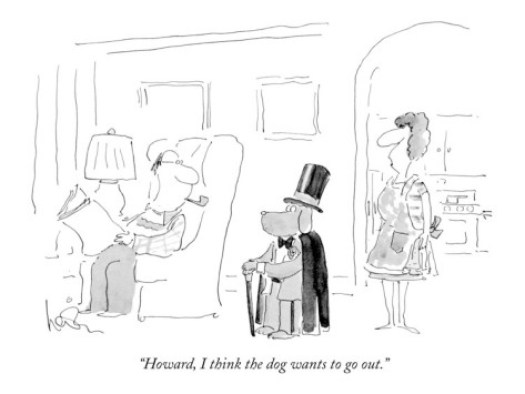Virtual Memories Show 222: Arnie Levin
Podcast: Play in new window | Download
Subscribe: Spotify | TuneIn | RSS | More
“Don’t fraternize with inkers; they’ll always get you in trouble.”
 Cartooning, illustration and animation legend Arnie Levin joins the show to recount his epic career and life. We talk about Beatnik-era New York, his mother’s decades-long plot to turn him into a New Yorker cartoonist, the value of a good art director, telling the Marines he wanted to be a photographer, his two-minute education in directing animation, what it was like to see his style copied by an artist who was previously copying another artist’s style, the time Allen Ginsberg tried to give him an iguana, and more! Give it a listen! And go check out his work at Art.com!
Cartooning, illustration and animation legend Arnie Levin joins the show to recount his epic career and life. We talk about Beatnik-era New York, his mother’s decades-long plot to turn him into a New Yorker cartoonist, the value of a good art director, telling the Marines he wanted to be a photographer, his two-minute education in directing animation, what it was like to see his style copied by an artist who was previously copying another artist’s style, the time Allen Ginsberg tried to give him an iguana, and more! Give it a listen! And go check out his work at Art.com!
Enjoy the conversation! Then check out the archives for more great episodes!
Lots of ways to follow The Virtual Memories Show! iTunes, Twitter, Instagram, Soundcloud, Facebook, Tumblr, and RSS!
About our Guest
 This is adapted from Richard Gehr‘s wonderful book, I Only Read It for the Cartoons: The New Yorker’s Most Brilliantly Twisted Artists
This is adapted from Richard Gehr‘s wonderful book, I Only Read It for the Cartoons: The New Yorker’s Most Brilliantly Twisted Artists:
Born in 1938, the diminutive Levin sports the shaved head, handlebar mustache, and slightly rolling gait of a badass biker. Much of his upper body is tattooed with ornate Japanese imagery by a renowned yakuza body illustrator. And the more you learn about his life, the wider the gap between creator and creations seems to spread.
Levin served in the Marines before winding up as an aspiring painter amid New York City’s late-fifties beatnik heyday. “Swept up in the glamour of the beatnik era,” as he puts it, Levin co-operated an espresso house that hosted readings by the likes of Allen Ginsberg and Jack Kerouac. He worked parties as a rent-a-beatnik, encountering Bob Dylan, another new kid in town, during one such event.
At Push Pin Studio, then at the height of its influence upon the design world, he was plucked out of the messenger pool by Milton Glaser, who recommended him to Lee Savage’s Electra Studio, famous for its forward-looking movie trailers and commercials. After leaving Electra, Levin was recruited for The New Yorker by art director Lee Lorenz in 1974.
After taking up motorcycling at age of fifty-nine, Levin celebrated his new hobby with the aforementioned flurry of tattoos. He’s given up biking in the interests of personal safety, however, and now resides more or less quietly on Long Island in New York with his wife.
Credits: This episode’s music is Nothing’s Gonna Bring Me Down by David Baerwald, used with permission from the artist. The conversation was recorded at Arnie’s home on a pair of Blue enCORE 200 Microphones feeding into a Zoom H5
digital recorder. I recorded the intro and outro on a Heil PR-40 Dynamic Studio Recording Microphone
feeding into a Cloudlifter CL-1
and a Mackie Onyx Blackjack 2×2 USB Recording Interface
. All processing and editing done in Adobe Audition CC
. Photo of me and Arnie by me. It’s on my instagram. Photo of Arnie’s ink by Nate Ndosi.






















